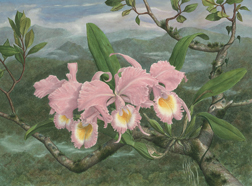

A monthly growers advice column by Courtney Hackney. Hackneau@comcast.net
There is no topic I hate to discuss more than the subject of pesticides. Unfortunately, it is one of the most requested subjects. There are many reasons for my reluctance, foremost being that these are toxic substances and there is always the possibility of a reader misunderstanding or misinterpreting some key point. There are, however, some important things everyone should know.
First, is that every orchid grower should assume that every product is toxic to people and pets, no matter what they have been told or even what is on the label. Historically, it has been the products we were not worried about that turned out to be the problems. My advice is to use protective gloves and a respirator, even if you are using some seemingly innocuous product such as insecticidal soap.
I am often asked “what are your favorite pesticides”. My answer is none of the above, because I have no favorite. In fact, my preference would be to never use a pesticide if I could. After years of using all kinds of different products from very toxic to supposedly non-toxic, I am convinced that all of them have some potentially negative effect on orchids. Unfortunately, orchids, like most other cultured plants, have a battery of insect and other pests that can kill them if left unchecked. The most lethal are scale insects: most lethal because they can be almost unseen and literally “suck the life” out of your orchids. The good news is that there are many products that kill them. The bad news is that scales reproduce rapidly, spread quickly, and have pesticide-resistant life stages, making frequent applications a necessity. Many of the most damaging species of scale are largely resistant to common pesticides.
Scales, like many insects, are particularly vulnerable to being smothered by oil sprays or desiccated by soaps that remove their outer protective coatings allowing them to dry up. Because they must shed their outer shells to grow, they are also vulnerable to new hormonal products that target their molting cycle. The high cost and instability of some of these pesticides makes them unavailable to most orchid hobbyists.
A number of hobbyists have told me that they have had some success using insect predators. My few attempts at using natural predators were notably unsuccessful, as the predatory insects vanished soon after their release in the greenhouse. Clearly, this is not a method that would work in the home environment either.
Growers with small numbers of plants treat scale relatively easily with products available at the “local store”. The first product you will need is a magnifying glass. New growers often do not even know that they have a problem because these pests are relatively small creatures, and hide well. Often problems are not suspected until there is a massive infestation. Some patient folks use Q-tips dipped in rubbing alcohol to remove and kill scale as they are found. Others fill large buckets with insecticidal soap or light oil and dip the entire plant, pot and all, covering every surface with the oil or soap.
These are all effective methods for the small grower who really does not need to use the more toxic products. There are also times where it is easier to discard an orchid that has somehow become covered with scale before it infects others in your collection. Lastly, assume that any orchid you add to your collection has this devious little insect hiding somewhere, and treat it appropriately.